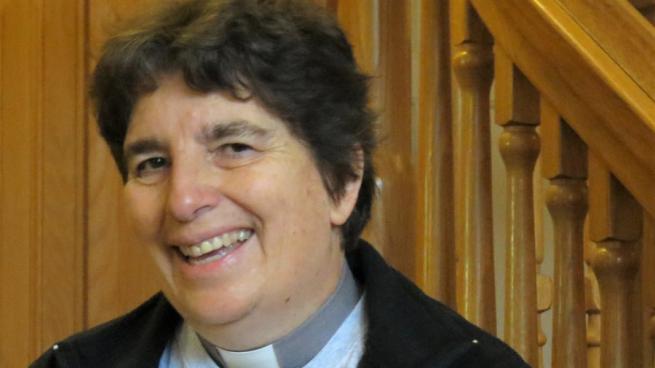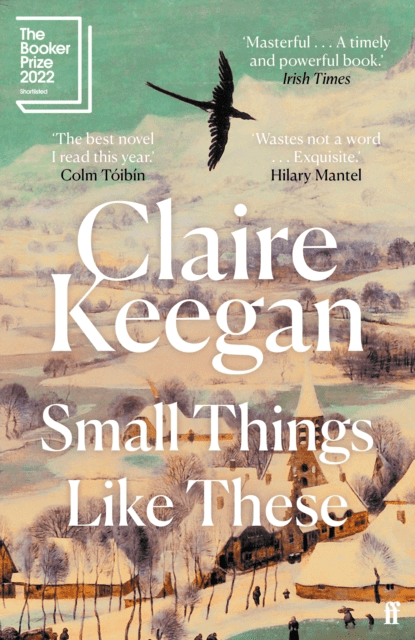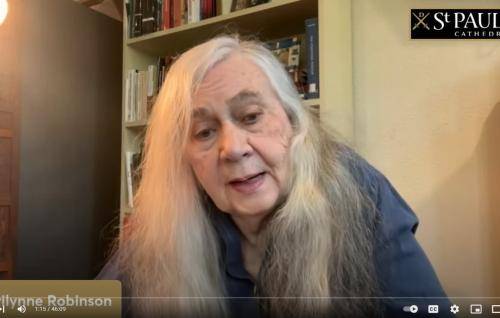Summer Reading
Summer Reading
Cathedral Chaplain Paula Hollingsworth reflects on five novels that feed her soul and her spirit.
Summer is coming! Many of us are looking forward to days of warm sunshine, to summer holidays or days in the garden or local park, when we can lose ourselves in a great story. What novels might you include on your Summer Reading List?
I have read many novels that I have found deeply spiritual. They may not have an overtly religious theme, but they help me to think about spiritual questions and about how I live my life as a person of faith. Throughout June I am going to introduce you to five novels that I love, and that feed my soul and my spirit.
Today’s novel is Claire Keegan’s Small Things Like These. Set in a small town in Ireland at the end of the twentieth century, this is the story of Furlong, a man in his forties, a husband and father. At the beginning of the novel, we are told that Furlong has learned to ‘keep his head down and stay on the right side of people, and to keep providing for his girls’. But now, as he reflects on the small acts of kindness that have made such a difference to him throughout his life, he is becoming more aware of the cruelty being meted out in his community, cruelty which everyone else is ignoring.
At one point in the story Furlong finds that he has lost his way, and he asks an old man where the road he is on is leading. He gets the reply, ‘This road will take you wherever you want to go, son’. And Furlong finally recognises where his life’s road needs to take him, and the stage is set for his costly act of defiance, of bravery, of great kindness. And as I come to the end of this novel, I find myself cheering him on.
This is a story that speaks to me profoundly and challengingly about nature of the Kingdom of God – of justice, mercy, kindness and goodness - and where and how I might seek God’s kingdom in my life. What such a novel asks of us is to read it slowly. Small Things Like These is the story of a man who is learning to reflect on how he should lead his life, and it calls us to read it slowly so that we can both ponder the change of direction that Furlong makes, and consider the choices and changes that we might need to make in our own lives.
Some questions you may like to ask yourself as you read:
- Where do you see the Kingdom of God in this novel?
- What small acts of kindness have helped to shape your life?
- Is there any change in your life that you need to make?
- Where do you want to road of your life to take you?
Happy reading!
As we look forward to the summer, some of us are planning our ‘Summer Reading’. In these June reflections, I am introducing you to some of the novels that feed my soul and my spirit.
I have found that a novel set within the world of another faith can not only open my eyes to the reality of religious faith in a very different context to my own, but it can help me to explore some of the conflicts and challenges I face as I try to live my life in a way that is consistent with what I believe.
What does it mean to remain true to your calling of faith and to your calling to remain true to yourself, true to the gifts you were born with, to your aspirations, to your human nature? This is the question at the heart of My Name is Asher Lev, Chaim Potok’s semi-autobiographical novel.
Asher Lev grows up as an observant Jew in New York in the mid twentieth century in the world of the fictional Ladover Hasidic Community (which is similar to the real life Lubavitch Hasidic Community). His father helps Ladover Jews to escape from Soviet Russia and sets up new Ladover communities in Europe and North America, and Asher grows up with the stories of the immense suffering and persecution of his ancestors. Asher has an extraordinary talent as an artist, which increasingly causes divisions within his family and his community. He tries to remain faithful to his faith, but he also feels compelled to pour out his feelings and experience into his art, and near the end of the novel he speaks of himself as ‘….an observant Jew working on a crucifixion because there was no aesthetic mould in his own religious tradition into which he could pour a painting of ultimate anguish and torment’.
And so this deep novel about a religious Jewish boy, ends in inviting us to ponder the depths of meaning of Christ’s cross.
Some questions you may like to ask yourself as you read:
- What is important to Asher about his faith?
- How does Asher’s relationships with his mother and father change over the course of the novel?
- Why does he paint the Brooklyn Crucifixions?
- What are the challenges you face as you seek to live your life as a person of faith?
Happy reading!
In the RomCom film You’ve Got Mail, children’s bookshop owner Kathleen Kelly (played by Meg Ryan) says ‘When you read a book as a child it becomes part of your identity, in a way that no other reading in your whole life does’.
I was lucky enough to read and re-read I am David as a teenager, and I do indeed feel that David’s story is part of my identity - but I have found even more inspiration within its pages when I have read it again as an adult.
Following Pilgrim’s Progress, many novels that people consider to be spiritual are based around a journey. Twelve-year-old David has spent almost all his life in a concentration camp in Soviet Eastern Europe, but he is enabled to escape by the most hated of his camp guards, and told to make his way to Denmark.
Significantly, David has the ability to reflect on what is happening to him, and so the story is about his inner journey as well as about the physical journey he makes. Some of his reflections are life affirming, such as when he discovers colour and beauty, some are poignantly sad, such as when he realises that he is not like other children because he does not belong.
We see how his understanding of God – whom he calls ‘The God of the green pastures and the still waters’ - develops along with his understanding of his own ethical framework and personal autonomy - ‘I am David’ is his regular mantra; and the story explores what it means for him to begin to be able to trust God and to trust other people.
And as he journeys, David discovers where he is coming from and where he is going to.
Some questions you may like to ask yourself as you read:
- What has David learned from Johannes?
- What does David learn from Carlos? From Maria? From the dog, King?
- How does David’s story challenge and inspire you?
- What books would you say are part of your identity?
Happy reading!
‘In old days there were angels who came and took men by the hand and led them away from the city of destruction. We see no white winged angels now. But yet men are led away from threatening destruction; a hand is put into theirs which leads them forth gently … and the hand may be a little child’s.’
This is my favourite quote from my recommendation this week for your Summer Reading - George Eliot’s Silas Marner. I love this novel! I have read it every few years since I was fourteen, and I find more depths and discover new insights each time I come back to it.
To me, the writing of George Eliot (a pseudonym – the writer was Mary Ann Evans), exemplifies the difference between the writing and content of a novel and that of theology – particularly systematic theology which explores doctrine and seeks to define and explain. In a novel, the novelist can use imagination, explore mystery, and point to a reality that they do not need to define or explain.
As a young woman George Eliot refused to go to church with her family (a shocking refusal in the 1840s), saying that she could not accept the church’s teaching – and she remained outside the traditional doctrines and teachings of the Church throughout her life. And yet this novel Silas Marner, the story of how an unhappy man’s life is transformed by the arrival of the child Eppie, is a profound reflection on the Christian doctrine of the Incarnation as well as being infused with the Christian themes of faith, hope and love.
Some questions you might like to ask yourself as you read:
- How does Silas Marner’s relationship with God change through the novel?
- How does Silas Marner become part of the community of Raveloe?
- How is justice explored? Reflect of the consequences of the actions of Dunstan Cass and the Lantern Yard congregation, and on the actions and inactions of Godfrey Cass.
- How does George Eliot use darkness and light in the novel?
Happy reading!
My final recommendation for your Summer Reading is an epic novel! Both epic in length (about 600 pages), but also epic in its storyline, depth of drama, and range of characters.
Set in India during a time of political emergency in the mid 1970s, the novel traces the life’s journey of four very different main characters: Dina, Maneck, Ishvar and Om, in a story that involves power abuse, corruption, caste segregation and dire poverty. But it is also a novel that explores the life changing nature of friendship and the potential of the human spirit. This is a book that you will not quickly forget!
‘You have to maintain a fine balance between hope and despair’ a man on a train says to Maneck, and the novel explores the characters’ ability to do that. The novel also explores how we can get to a place of balance in our relationships, and there is a glorious section two thirds of the way through the book when the four main characters’ lives are well balanced with each other and they share a home with great harmony and humour.
To me this is a spiritual book because it makes me, the reader, ask the hard questions that are asked within the novel: Where is God? How can God ‘allow’ such poverty and dire suffering to happen in the world? Why do some people manage to be sustained by hope when others fall into despair?
Some other questions you might like to ask yourself as you read:
- Which of the characters’ stories did you find the most powerful? Why?
- Which of the characters surprised or inspired you? Why?
- What, in the novel, made you the most angry?
- How do you find the right balance between hope and despair in your life?
Happy reading!

The Revd Paula Hollingsworth is Chaplain at St Paul's Cathedral, with responsibility for offering pastoral support to the Cathedral community and to visitors. She is the author of The Spirituality of Jane Austen: Her Faith Through Her Life, Letters and Literature (Lion Books 2017). In our 2020 Lockdown Bookclub she recommended Kent Harif’s Plainsong: watch what she said about it here.











